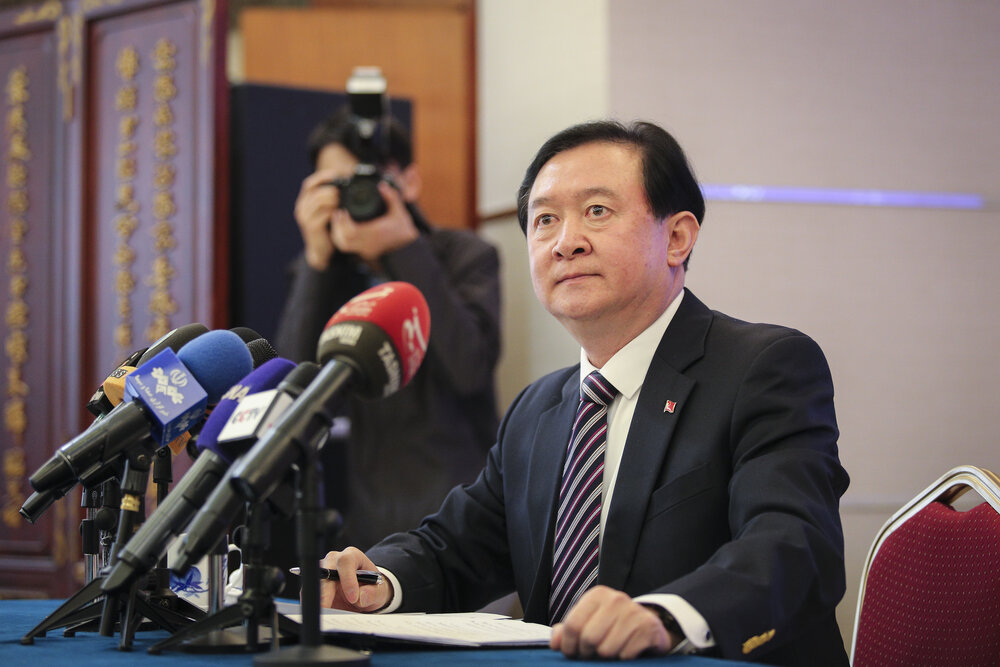Beijing envoy says will make every effort to expand Iran-China tourism ties

Chinese ambassador in Tehran Chang Hua said on Wednesday that the embassy will make every effort to expand tourism relations between the two countries.
“I hope that Chinese arrivals in Iran will be increased in the future and I believe such travels are essential for the two nations to become more familiar.”
The envoy made the remarks at a press conference at China’s embassy in Tehran, during which he discussed a range of issues such as coronavirus outbreak in China and beyond, economy, trade, and travel.
Currently, flights between the two countries have been [temporarily] suspended as a means to control the disease, he added.
The ambassador also reminded attendees of his wish to become “a tourism ambassador” for Iran in order to help expand bilateral ties.
He also implicitly censured U.S. President Donald Trump for threatening to launch attacks on Iran’s cultural sites that belong to the entire global community.
In response to a question about the measures taken by the Chinese government to halt the spread of the coronavirus, the envoy said that a large number of Chinese medical experts are working hard to find a certain cure for the disease.
He also said international cooperation is underway in this regard.
He assured that the mortality rate of coronavirus is much less than some influenza viruses.
Elsewhere in his remarks, the envoy said, “The news on the novel coronavirus is logical and fair and we hope that this approach of Iranian media will be continued”.
“The outbreak will have influences in short-time and how far the impact will go relies on the time we can beat it.”
Speaking about Iran-China economic cooperation, he said, “It is being improved despite the pressure of the third country [the U.S.].”
“The U.S. has unilaterally withdrawn from the [2015 nuclear deal, internationally known as] JCPOA and is interfering with Iran’s economic ties with other countries.”
“Despite such difficulties, we are boosting bilateral ties with Iran,” he noted.
“China condemns U.S.’ unilateral moves and backs its legal ties with Iran,” he added.
Then, a video clip was broadcast for the attendees, showing several Iranian children speaking in Chinese, announcing support for China.
The envoy expressed thanks to those Iranian people and children who have announced their support for China via their tweets or video clips on social media.
He, in particular, hailed the stance of the Islamic Republic of Iran towards the issue, noting that Foreign Minister Mohammad Javad Zarif has been the first foreign minister in the world who announced support for China.
The ambassador also expressed gratitude for Iranian foreign ministry’s stances and support besides other Iranian officials including Health Minister Saeed Namaki and Tourism Minister Ali-Asghar Mounesan.
He referred to the recent tweets of Zarif and foreign ministry’s spokesperson Abbas Mousavi as good examples of Iran’s support for China under the present tough conditions.
He named the stance of Iranian officials and media as “impartial and fair”.
Lamenting about the U.S. stance towards the virus outbreak in China and measures done by the Chinese government, he said, “China feels responsible for its people and does the same for all people in the world.”
“In the last days of January, the World Health Organization managing director visited China and hailed our measures in combating and curbing the virus,” Hua said, “He hailed China’s measures for coping with a contagious disease as an example for the world.”
He quoted Iranian health minister as saying “a virus does not know borders,” adding, “I hope the one or two countries to cooperate with China facing the situation instead of abusing it.”
The Iranian government has waived visa requirements for passport holders from China and Hong Kong to attract more foreign tourists from the Far East; however, it is a unilateral measure i.e. Iranian tourists visiting China or Hong Kong still need visas.
Iran embraces hundreds of historical sites such as bazaars, museums, mosques, bridges, bathhouses, madrasas, mausoleums, churches, towers, and mansions, of which 22 being inscribed on the UNESCO World Heritage list.
AFM/MG
